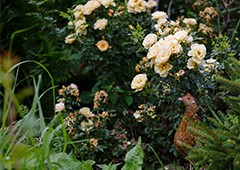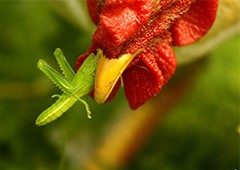What a wonderful world it would be if we could wake up each morning, take refuge under a shady palm, pluck a perfectly ripe organic avocado from our tree and scoop out and devour it’s deliciously buttery insides without even leaving our home…
For many this is all but a pleasant dream, but it doesn't have to be! Having your own fully sustainable organic garden can be a reality. Yes it will take a little TLC and you will have to get your hands and possibly knees a little dirty, but once you reap the sweet (and savoury) rewards you will never look back.
Gardening has long been known as a stress free and calming pastime, that can really evoke a sense of fulfilment and satisfaction. Especially when you can see your Grevillea thriving, or you have ripe tomatoes for the picking to toss in your morning omelette.
If you are wanting to be even more sustainable and reduce your carbon footprint even further, then organic gardening is the way to go!

What is Organic Gardening?
In short- organic gardening is when a garden is wholly maintained without the use of synthetic products such as pesticides and fertilizers. Instead, the garden relies on natural resources to help with their health and growth.
An organic gardener will work alongside nature and it’s natural systems to continually replenish any resources the garden consumes- all as part of a bigger natural system.
A great example of this is making a compost from your green manure, brown manure and kitchen waste and using it to feed the veggie patches soil.
There are four main things to concentrate on when it comes to creating a successful and thriving organic garden:
1. Feeding the Soil
2. Choose Your Plants Wisely
3. Pest Prevention is Key
4. Simple Solutions
Feeding the Soil

A rich and well nourished soil is the key to a healthy organic garden. After all, without it there would be no garden! The soil is where the garden will get most of its nutrients from, so it needs to be paid attention to regularly to ensure healthy, growing plants.
To create a organic soil that will harbour fertility, it will need to be fed organic matter. This includes things such as compost, manure, green waste and mulches, both worked into the soil and as a top dressing for extra nourishment.
Once you are able to create this delicious and rich soil, your plants will soak it up and be the picture of absolute health!
Choose Your Plants Wisely
Like with any garden, the best chance at having blossoming and thriving plants all comes down to the ones you select. It is important to choose plants that are suited to your garden site- not ones that you know are going to struggle in the given environment.
Plants that are known to adapt well to your climate and conditions will grow and thrive without a lot of attention and hard work. Whereas if you choose plants that are known to have difficulty growing in your climate conditions, they will require a lot more hard work to boost its natural defences to keep them healthy and strong.
Pest Prevention is Key
Just because you don’t use pesticides and chemicals, doesn’t mean that your garden will be overrun with nasty creepy crawlies, however you can expect the occasional pest here and there like with most gardens.
The first step to ensuring your plants are free of these pesky little plant predators is to be vigilant with monitoring. Inspect your plants regularly for signs of a problem and take the appropriate action- and this doesn’t necessarily mean blasting your plants with pesticide!
It is important to remember that not every insect is a cause for worry, and your garden will be able to live with a little damage, however if you spy an infestation and can deduce what it is- then you can then take the appropriate action to nip it in the bud!
There are many organic pesticides available if something has run rife in your garden and you need to resolve the problem fast. Each work in a different way and for different matters, so it best to do some reading into the problem before acting too fast which could result in further damage. (Also, don't forget that chickens are a great way to keep pests under control!)
A lot of times plants will incur a pest problem if they are stressed and don’t have the resources to defend themselves, so make sure they are nurtured with a rich and nourishing soil, are watered when thirsty, and given some tender loving care and work regularly.
It is important to keep your plants healthy by removing any diseased foliage or damaged waste from the area, otherwise problems and infestations can manifest in these areas and cause a spot of bother for your garden.
Simple Solutions
To make organic gardening as stress free as possible, you should always take the simplest approach when it comes to creating a solution to a problem.
Often you will find that taking the most drastic measure is not required, and to keep any problems at bay you will not need to act so irrationally.
For example, if you see a bug, put on some gloves and pluck it off, or if there are some aphids lingering about, spray them off with a hose- no blasting your precious plants with chemicals necessary!
If you refer to the previous point of observing and monitoring your plants on a regular basis, you will find that their care won’t be as difficult as it is often made out to be, and your plants will be happy, healthy and the envy of all neighbouring gardens.
Why Organic Gardening?
For the work and love you put into to maintaining your organic garden, you will reap a myriad of benefits- more than those you take from conventional gardening.
-
preserving biodiversity
-
reducing waste
-
reducing pollution
-
enhancing natural eco-systems
-
building your own knowledge
-
reducing your own exposure to chemicals
-
getting some exercise
-
being outdoors- fresh air, sunlight, vitamin D exposure
-
saves money
-
produce is more nutritious
-
produce tastes better
-
saves energy
-
partakes in sustainability practice to protect future generations
So if you have been umming and ahhhing over the prospect of creating an organic garden and dismissed the idea as it seemed like a lot of effort and hard work, we won’t lie- yes it may take a little more elbow grease than your conventional garden. But when you're munching on a crisp and tart apple plucked from your own organic garden, grown without the help of chemicals- you will be glad you made the organic investment.
Another great way to live a sustainable lifestyle is to keep your own chickens, of course! Chickens provide you with ethically produced, fresh organic eggs almost every day - so you can enjoy your organic vegetables with a side of scramble! Our Taj Mahal, Penthouse and Mansion chicken coops will keep your hens happy, healthy and laying lots of delicious organic eggs.



















